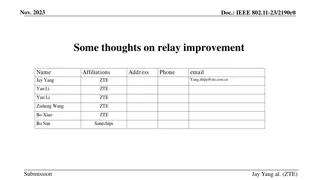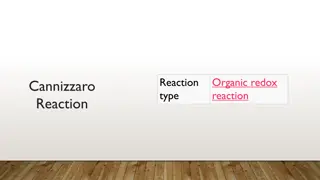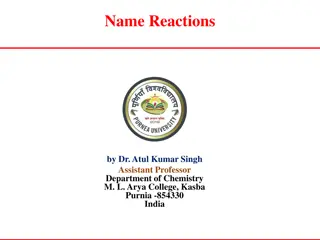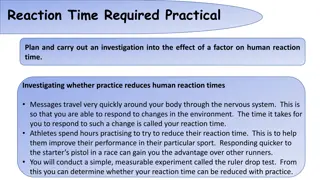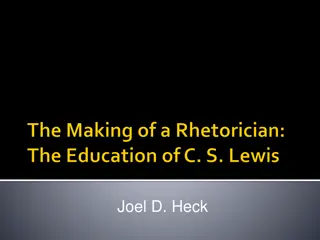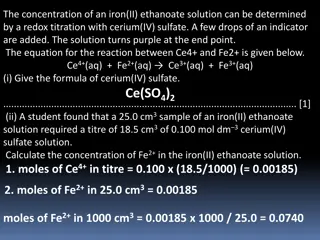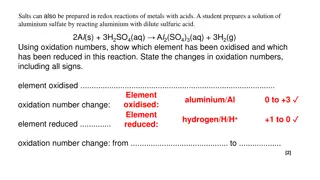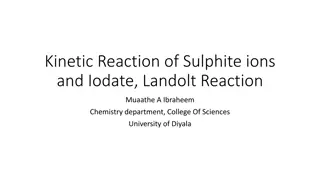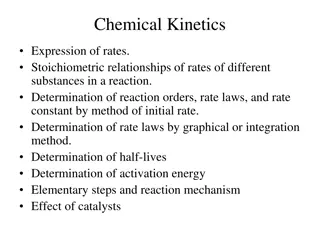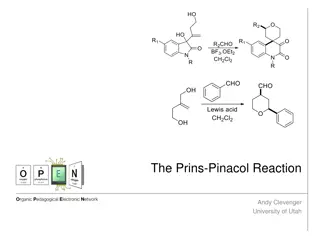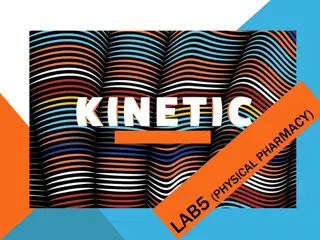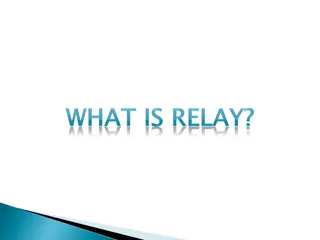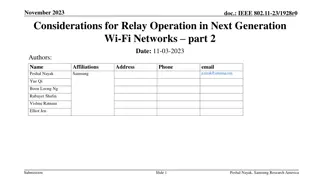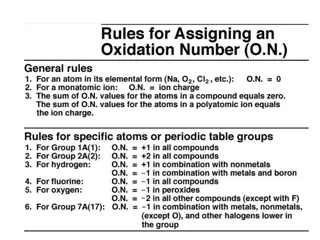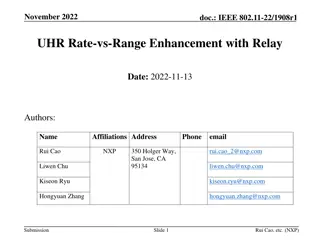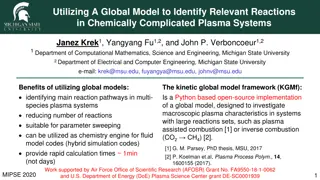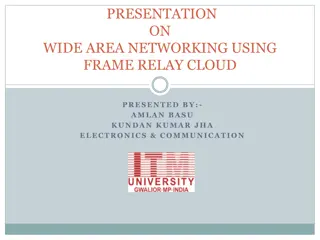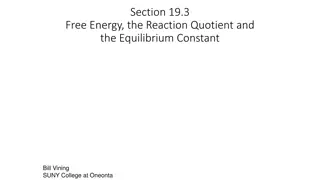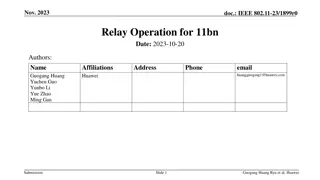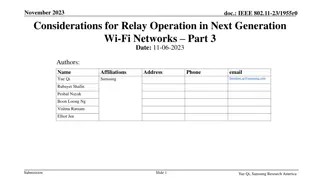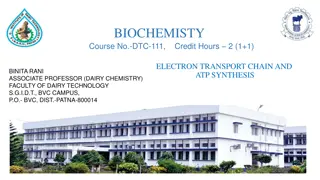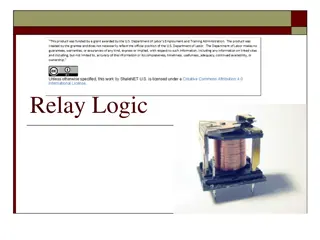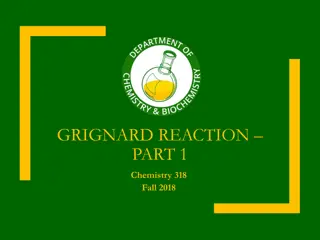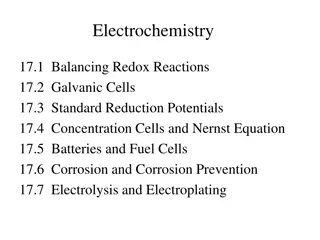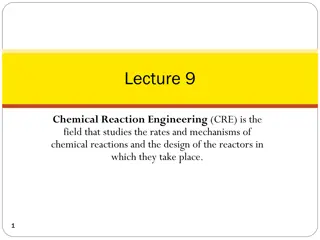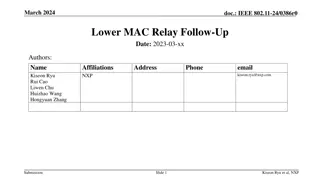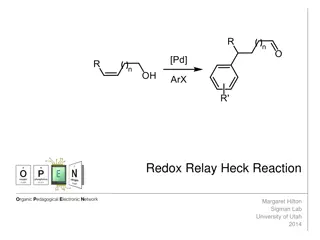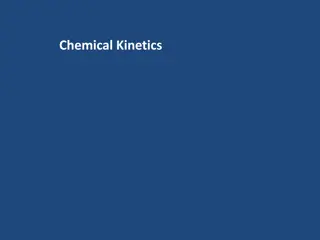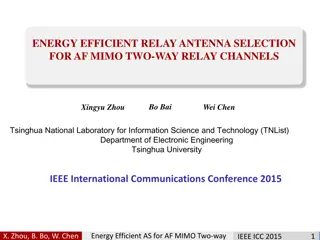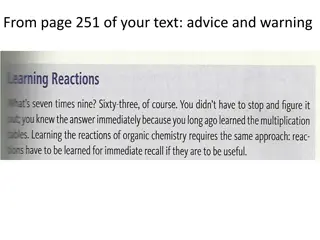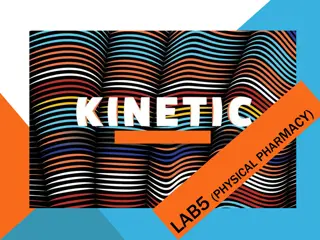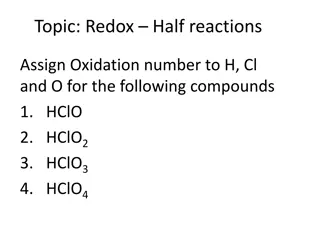Canizzaro Reaction in Organic Chemistry: Experiment and Applications
The Canizzaro reaction involves the disproportionation of aldehydes in the presence of a strong base to produce an alcohol and a carboxylic acid. This experiment, supervised by Lecturer Israa Radhi, explores the mechanism and practical application of the reaction. Benzyl alcohol and benzoic acid, pr
1 views • 7 slides
Enhancing Wi-Fi Relay Networks for Improved Coverage and Reliability
This document discusses the need to enhance relay frameworks in Wi-Fi networks to improve coverage, reliability, and performance of stations in different ranges. It highlights the challenges of S1G-based relays, proposes enhancements to the relay framework, and introduces new types of relay framewor
1 views • 12 slides
Understanding the Diels-Alder Reaction in Practical Organic Chemistry
The Diels-Alder reaction is a fundamental method in organic chemistry for producing cyclic organic compounds by combining a conjugated diene with an alkene. This reaction, named after Otto Diels and Kurt Alder, involves the formation of a six-membered ring with specific bond rearrangements. Conjugat
4 views • 15 slides
Cannizzaro Reaction
The Cannizzaro reaction is a chemical reaction involving the base-induced disproportionation of non-enolizable aldehydes to form a primary alcohol and a carboxylic acid. Discover more about this reaction, its history, mechanism, and variants like the Cross Cannizzaro reaction and Intramolecular Cann
1 views • 20 slides
Benzoin Condensation: A Name Reaction Explained by Dr. Atul Kumar Singh
Benzoin condensation is a classic organic reaction where aromatic aldehydes self-condense to form α-hydroxy ketones. Dr. Atul Kumar Singh, an Assistant Professor of Chemistry, details the mechanism and the specific catalytic properties of cyanide in this reaction. The reaction involves refluxing th
0 views • 6 slides
Investigating Impact of Practice on Human Reaction Time Through Ruler Drop Test
This practical investigation focuses on determining if practice can reduce human reaction times by conducting a ruler drop test. Participants use their weaker hand to catch a ruler dropped by their partner, aiming to improve their reaction time with practice. The experiment explores how athletes can
0 views • 7 slides
Influential Educators: Joel D. Heck, Flora Hamilton Lewis, and Beatrix Potter
Explore the educational journeys of Joel D. Heck, Flora Hamilton Lewis, and Beatrix Potter, from their academic backgrounds to their deep thoughts on education and rhetoric. Discover the impact of influential figures like Harry Wakelyn Smith and the profound influence of MacDonald's book "Phantastes
1 views • 33 slides
Chemical Analysis and Redox Reactions in Chemistry
Iron(II) ethanoate concentration determination using redox titration with cerium(IV) sulfate, balanced redox equations for manganate(VII) ion oxidizing iron(II) ion, and calculations of iron percentage in samples using titration with potassium manganate(VII). Molarities and concentrations are calcul
1 views • 6 slides
Understanding Redox Reactions in Chemistry
Salts can be prepared through redox reactions involving metals and acids. This interactive lesson covers oxidation numbers, identifying oxidized and reduced elements, and explaining electron transfer in redox reactions. Examples include reactions of aluminum with sulfuric acid and magnesium with cop
2 views • 12 slides
Kinetic Reaction of Sulphite and Iodate - Landolt Reaction Overview
The kinetic reaction of sulphite ions and iodate in the Landolt reaction is a fascinating chemical process where slow and fast reactions occur sequentially, resulting in a visually striking color change. By monitoring the induction period between the two reactions, one can observe the formation of h
0 views • 9 slides
Understanding Chemical Kinetics: Rates, Reactions, and Mechanisms
Chemical kinetics involves studying reaction rates, rate laws, stoichiometry, and factors affecting reaction speed. This branch of chemistry delves into determining reaction orders, rate constants, and activation energies using various methods. Different types of rates, such as initial, instantaneou
2 views • 68 slides
Understanding the Prins-Pinacol Reaction in Organic Chemistry
The Prins-Pinacol reaction involves a two-step process starting with the Prins reaction and followed by the Pinacol rearrangement. This reaction, discovered in 1919 by Hendrick J. Prins, is a crucial transformation in organic chemistry, leading to the formation of important carbonyl compounds. The m
0 views • 14 slides
Understanding Kinetics and Reaction Rates in Chemistry
Kinetics is the study of reaction rates and factors affecting them, such as concentration, temperature, catalysts, and more. Orders of reaction classify reactions based on rate dependency on reactant concentration. Factors like pH, light, and solvents can also impact reaction rates. Half-life and sh
0 views • 18 slides
Understanding Soil Chemistry and Redox Reactions in Environmental Chemistry
Soil chemistry plays a crucial role in sustaining healthy soils by influencing nutrient availability through oxidation and reduction processes. Redox reactions in soil are impacted by factors like oxygen content and water presence, affecting nutrient supplies. The redox status of soil reflects its n
1 views • 92 slides
Understanding the 5V Relay Module and Its Applications
A 5V relay module is an electrically activated switch commonly used in switching circuits for home automation projects, controlling heavy loads, safety circuits, and automotive electronics. This small relay board works with a 5V signal and can handle up to 10A of current for both AC and DC loads. It
1 views • 7 slides
Considerations for Relay Operation in Next Generation Wi-Fi Networks
In this document, considerations and use cases for relay operation in next generation Wi-Fi networks are discussed. The authors provide insights into the improvements in reliability and throughput, focusing on the benefits of relay features in various scenarios such as smart home devices and automot
0 views • 11 slides
Understanding Chemical Kinetics: Reaction Rates and Mechanisms
Chemical kinetics is a branch of chemistry focused on studying reaction rates and mechanisms. Unlike thermodynamics, which deals with feasibility, kinetics explores the speed at which reactions occur. Factors such as temperature, pressure, and catalysts influence reaction rates. Understanding the ra
3 views • 72 slides
Understanding Redox Reactivity and Balancing Equations in Acidic Solutions
Exploring the concept of reactivity in redox reactions using zinc, nickel, and copper, followed by a detailed guide on balancing redox equations in acidic solutions. Learn how to determine oxidation numbers, identify redox atoms, balance charges, and handle oxygen and hydrogen atoms to achieve balan
0 views • 18 slides
Fun Team Relay Games for Physical Education
Engage in exciting and interactive team relay games like Locomotor Relay, Long Jump Relay, Crab Walk Relay, Over/Under Relay, and V-Sit Relay. These activities promote teamwork, coordination, and physical fitness in a fun and engaging way. Set up cones, form teams, and enjoy these dynamic relay chal
0 views • 6 slides
Evolution of Relay Services for Deaf and Hard of Hearing Individuals
The history of relay services for the deaf and hard of hearing dates back to the 1960s in the USA. Three pioneering deaf men played a significant role in establishing the first successful deaf telephone network, leading to the development of relay services as we know them today. This evolution enabl
0 views • 29 slides
Relay Communications for Ultra High Reliability in IEEE 802.11-22/1908r1
Investigating relay communications to enhance Rate-vs-Range (RvR) performance for Ultra High Reliability (UHR) in IEEE 802.11-22/1908r1. The content explores relay design objectives, goodput analysis, existing relay solutions like WiFi extenders, and the challenges in implementing relay technology t
3 views • 16 slides
Utilizing a Global Model for Analyzing Reaction Pathways in Plasma Systems
This research focuses on using a kinetic global model framework to identify relevant reactions in chemically complex plasma systems. The framework, KGMf, enables the investigation of macroscopic plasma characteristics by analyzing reaction pathways, sensitivity to reaction rate errors, and dominant
1 views • 6 slides
Understanding Wide Area Networking Using Frame Relay Cloud
The field of networking is advancing rapidly, with technologies like cloud computing relying on robust wide area networking. This presentation explores the use of Frame Relay Cloud in improving the security and configuration complexities faced in interconnecting wide area networks. It discusses the
0 views • 16 slides
Enhancing Internet Telephony Quality Through Predictive Relay Selection
Examining the quality of Internet telephony in relation to network performance, this research explores the use of Managed Overlay to improve call quality for services like Skype. Analysis of 430 million Skype calls reveals that a significant portion experience poor network performance, emphasizing t
1 views • 26 slides
Understanding Free Energy, Reaction Quotient, and Equilibrium Constant
This educational material delves into the concepts of free energy, reaction quotients, and equilibrium constants in chemical systems. It explains how to determine the direction of a reaction based on Q and K values, elucidates the role of Gibbs free energy in determining spontaneity, and provides ca
0 views • 10 slides
IEEE 802.11-23/1899r0 Relay Operation for 11bn - Presentation Summary
In this presentation, the IEEE 802.11-23/1899r0 document discusses relay operations to improve Rate-vs-Range (RvR) performance for UHR. Various potential solutions for implementing a relay protocol in UHR are explored, focusing on enhancing multi-hop channel access delay, end-to-end QoS, and simplif
0 views • 10 slides
Considerations for Relay Operation in Next-Gen Wi-Fi Networks
This presentation discusses the considerations and features for relay development in next-generation Wi-Fi networks, focusing on improving coverage in dead zones, enhancing throughput, and reducing energy consumption. It explores concepts like multi-traffic multiplexing in relay transmission and pow
0 views • 9 slides
Understanding Electron Transport Chain and ATP Synthesis in Biochemistry
This course delves into the intricacies of electron transport and oxidative phosphorylation in biochemistry, elucidating how NADH and FADH2 are re-oxidized to generate ATP in eukaryotes and prokaryotes. It explores redox potential, oxidation-reduction reactions, and the role of standard redox potent
0 views • 20 slides
Understanding Relay Logic and Circuits
Explore the world of relay logic and circuits with detailed explanations, images, and practical examples. Learn about basic relays, labeling, simple relay logic circuits, sump pump relay circuit, NAND burglar alarm, and various relay logic gates (AND, OR, NAND, NOR). Dive into the functioning of rel
0 views • 17 slides
Grignard Reaction in Chemistry Lab: Part 1 Overview
The Grignard Reaction Part 1 in Chemistry 318 Fall 2018 involves the preparation of the Grignard reagent, its reaction with CO2, and the isolation of the benzoic acid product. The experiment spans two lab sessions, focusing on safety precautions, pre-lab checks, and upcoming due dates. Students are
0 views • 11 slides
Understanding Electrochemistry: Redox Reactions, Cells, and Equations
Electrochemistry is a branch of chemistry that involves redox reactions, galvanic cells, standard reduction potentials, balancing redox equations, batteries, corrosion prevention, and electrolysis. Learn about the fundamental principles, examples of redox reactions, and how to balance equations usin
0 views • 61 slides
Introduction to Chemical Reaction Engineering (CRE)
Chemical Reaction Engineering (CRE) focuses on studying the rates and mechanisms of chemical reactions, as well as designing reactors for these reactions. The field involves understanding balances in terms of molar flow rates, mole balances, rate laws, stoichiometry, and membrane reactors. Membrane
0 views • 20 slides
IEEE 802.11-24/0386r0 Lower MAC Relay Protocol Details
Detailed discussion on supporting the relay protocol in IEEE 802.11bn, covering relay addressing, end-to-end BA, relay TXOP protection, beacon forwarding, security processing, non-UHR STA support, sounding procedure, A-MPDU aggregation, de-aggregation, and more. The relay operation involves relay de
0 views • 16 slides
Understanding the Redox-Relay Heck Reaction in Organic Synthesis
The Redox-Relay Heck Reaction is a powerful tool in organic synthesis that allows for the functionalization of olefins with aryl groups. Developed by Sigman and colleagues, this reaction involves a palladium-catalyzed relay controlled by a thermodynamic sink, leading to the formation of aldehydes or
0 views • 6 slides
Understanding Chemical Kinetics: Reaction Rates and Activation Energy
Exploring the fundamental concepts of chemical kinetics, this content delves into reaction rates, collision theory, and activation energy in chemical reactions. It emphasizes the importance of particle collisions, correct orientation, and energy requirements for reactions to occur. Through energy di
0 views • 17 slides
Redox Conditions and pH Control in a Mountain Watershed: Study in Red Canyon, Wyoming, USA
Exploring redox conditions and trace element concentrations in a semi-arid mountain watershed, this study in Red Canyon, Wyoming, delves into the impact of oxic surface water and anoxic groundwater on trace element cycling. The investigation aims to enhance understanding of seasonal variabilities, f
0 views • 11 slides
Energy Efficient Relay Antenna Selection for AF MIMO Two-Way Relay Channels
The study explores energy-efficient relay antenna selection for AF MIMO two-way relay channels, aiming to optimize energy efficiency while maintaining performance. It discusses the advantages and disadvantages of two-way MIMO relay systems, emphasizing higher spectral efficiency, improved reliabilit
0 views • 17 slides
Reactions of Alkenes: Strategies and Mechanisms
The excerpt provides detailed insights into reactions of alkenes, emphasizing main reaction classes, key characteristics, intermediate states, and specific mechanisms like bridgehead halohydrin. It covers important concepts such as carbocation addition, free radical addition, and organometallic/redo
0 views • 12 slides
Understanding Kinetics in Chemical Reactions
Kinetics is the study of reaction rates and factors affecting them. Reaction rate is the speed at which a reaction occurs, influenced by factors like concentration, temperature, pH, light, catalysts, and solvents. Reactant concentration determines reaction order, which categorizes reactions as zero-
0 views • 18 slides
Understanding Redox Half Reactions: Assigning Oxidation Numbers and Half-Reactions
In this content, we explore assigning oxidation numbers to elements in compounds such as HClO, HClO2, HClO3, and HClO4. We then delve into the Haber Process to understand redox reactions. The concept of oxidation and reduction, as well as the significance of electrons in these reactions, is illustra
0 views • 20 slides

